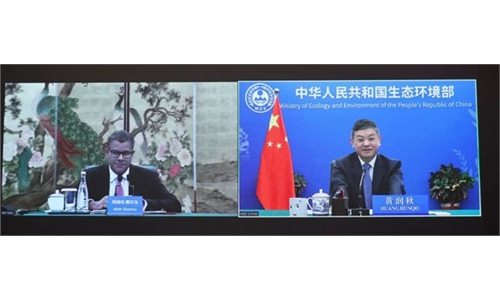COMMENTS / EXPERT ASSESSMENT
China-UK graphene cooperation should be free of politics

Illustration: Tang Tengfei/Global Times
As the UK has been tightening scrutiny over foreign investment under a stretched concept of national security, a potential acquisition by a Chinese scientist-founded firm of a small Welsh graphene manufacturer has appeared to become the latest target of such scrutiny.
UK Business secretary Kwasi Kwarteng has ordered a national security review of the planned takeover of Perpetuus Group by Taurus International or any companies associated with the Chinese academic Zhou Zhongfu, the Guardian reported on Tuesday.
The details of the acquisition and the subsequent review have yet to be disclosed. But the move targeting the Chinese investors is not entirely unexpected, against the backdrop of the UK's heightening scrutiny of Chinese investment and a weakened mutual trust between the two countries in recent years. Still, the UK must keep mutually beneficial cooperation with China from political obstruction.
As a cutting-edge super material, graphene has wide range of applications in areas such as telecommunication, aerospace and advanced electronics. It has been one of the key cooperative fields between China and the UK. Since 2015, China and the UK have rolled out multiple collaboration projects focused on research and development (R&D) relating to graphene.
For instance, Chinese telecom giant Huawei announced a partnership with the National Graphene Institute at the University of Manchester in 2015 to research graphene and related 2D materials. In 2018, a China-UK graphene industrial park was set up in Jinan, East China's Shandong Province. Later in 2019, a Chinese technology firm Tunghsu Group partnered with the University of Manchester to promote R&D and commercial application of suspended graphene sensor chip products.
By combining each side's strengths in R&D and application, the bilateral cooperation on the development of grapheme was in fact viewed in a positive light. The UK has been a leading player in grapheme R&D, while China has been offering a highly attractive business environment and a vast market for commercial application, which has become a mature cooperative model between China and European countries, including the UK.
According to the Xinhua News Agency, the Beijing Municipality launched a seed incubation park at its graphene industry innovation center in November 2019, with a 220-million-yuan ($31.3 million) venture capital fund set aside to support R&D at startups in the incubation park, aiming to serve 100 upstream and downstream enterprises throughout the graphene industry chain.
Falling back on a flimsy national security justification to limit or cut bilateral cooperation on the sector will undoubtedly hurt the graphene industry, both in the UK and in China. It will affect bilateral cooperation in other areas because business confidence may be further undermined by any potential politically-motivated actions on the part of the UK.
An expected outcome could be that Chinese investors will then have second thoughts when considering business cooperation with the UK. More importantly, any unreasonable action in the national security review may be viewed as a new policy direction adopted by the UK that clouds the overall China-UK diplomatic environment.
Despite certain headwinds, cooperation between China and the UK should and can be maintained, as long as the UK government can manage to find a balance point between political gamesmanship and pragmatic cooperation in science and technology. A positive sign is that the UK has so far appeared to be unwilling to rule out cooperation completely.
If the UK's national security review of the graphene firm's takeover will result in a "soft landing," even though with a higher cooperation threshold, mutually beneficial cooperation on the R&D of graphene can still be carried on. Development of the graphene industry relies on international cooperation. Moreover, maintaining a stable relation with China is in the UK's national interest and is the best path forward for London in the current international climate.
So-called national security concerns over China or Chinese companies, an ill-conceived narrative pushed by the US and certain anti-China forces, are nothing but a political weapon of Washington and these anti-China forces to contain China's development.
The article was compiled based on an interview with Cui Hongjian, director of the Department of European Studies at the China Institute of International Studies. bizopinion@globaltimes.com.cn



